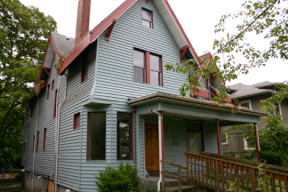Three proposals designed to put the shuttered Phoebe House at 1419 S. Yakima Ave. back into operation by affordable housing operators or human service providers in Tacoma have failed to meet the expectations of city staffers, according to discussion Oct. 3 during the Tacoma City Council Neighborhoods and Housing Committee meeting.
Our recommendation is to reject the proposals submitted based upon the [limited] track records and experiences of the proposers, said Ric Teasley of the Tacoma Economic Development Department.
Instead, Teasley recommended that the city sell the house for the purpose of single-family occupancy, instead of group-home or affordable housing.
The three organizations that prepared proposals for the property include House on the Rock, Freedom House, and the National Association for Black Veterans.
House on the Rock proposed using the site as emergency and transitional housing with support services for six women and their children. Through cooperative agreements with other agencies, House on the Rock would provide case management, job skills training, education, and mental housing counseling. According to a review prepared by city staffers, however, the agency appears to be in its start-up phase. Considering the agency appears to be new and with no identified staff, said Teasley, it is suspect as to its ability to carry out the proposed activity. The condition of the house and the funds needed to bring the house to a livable condition makes this [proposal] very weak.
Freedom House proposed using the site for sobriety services and transitional housing for 16 homeless women and their children. The proposal, however, does not list any services currently offered. Teasley commented that the agencys lack of prior housing service, as well as the failure to clearly identify any financial support, were problematic.
Finally, the National Association for Black Veterans proposed using the site to provide housing and services to homeless veterans. However, city staff expressed concerned about the agencys limited experience in providing services for homeless veterans, and no clear source of funds for providing proposed services at the site.
Considering the applications received, the staff recommends selling the house as a single-family-occupied home, said Teasley.
That recommendation represents a change of plans for the site, which the city has been trying to move forward on for more than three years.
On June 6, the committee directed staff and the Tacoma Community Redevelopment Authority (TCRA) to prepare the requests for proposal. At that meeting, Teasley commented, This house is most ideally suited for the type of service it offered before, referring to the home’s two stories, 4,200 square feet, and 14 bedrooms as amenable to a group-home environment.
Though the house is structurally sound, city staff estimate that approximately $120,000 to $160,000 of repairs are needed to the roof, gutters, windows, entry and exit doors, carpeting, siding, decks, stairs, plumbing, wallboards, and chimney. Potential oil contaminants, lead-based paints, and mold due to moisture infiltration also require attention. The State Housing Trust Fund could provide $89,325 and TCRA could provide $78,545, according to Teasley.
Earlier this year, the city valued the property at $255,000. However, that number dropped to $168,000 based upon area home values and repairs needed to the house.
The property is co-owned by the city and the State of Washington. Foreclosure action was completed on the Phoebe House in order to eliminate tens of thousands of dollars of debt accrued by the former Phoebe House Association. The association owned the building between 1995 and 2001, and provided transitional housing for women with substance abuse problems. In 2001, the association “went out of business and disappeared,” according to Teasley. That same year, the city purchased the property, as well as its sister Phoebe House at 712 Martin Luther King Way. In April 2004, the city council transferred ownership to the Tacoma Community Redevelopment Authority (TCRA), which then had plans to eliminate the debt, rehabilitate the house, and offer the building to another public organization.
On May 17, however, the city council approved a six-month moratorium on the expansion or opening of new group homes, halfway houses and transitional houses. The moratorium, however, provides exceptions for state-licensed facilities and residences where renters either are not part of a service provider program, or are covered by Washington’s landlord and tenant act.
The home has been vacant since 2001, and is well-known to transients and squatters. City staffers visit the property an average of two times per month to board windows and secure the home. The city also pays insurance on the vacant house. According to Teasley, neighbors have repeatedly asked about the city’s plans for the property.
During Mondays meeting, committee members expressed concern about what appeared to be a lack of interest in the property from established affordable housing and human service providers. Teasley told the committee that the city had informed the Tacoma Rescue Mission, Metropolitan Development Council, Catholic Community Services, and other human-service-based organizations about the property, but failed to receive interest.
Councilmember Spiro Manthou asked if the citys moratorium on group housing factored into the non-interest specifically.
I didnt hear anyone say specifically thats why they werent interested, said Teasley.
Councilmember Tom Stenger was concerned that the home — which includes two stories, 4,200 square feet, and 14 bedrooms — would be sold as a single-family residence. Teasley said the single-family language was used in light of the citys moratorium on group housing.
Councilmember Jonathan Phillips, who also works in real estate, said the $168,000 price tag was a reasonable value. The $250,000 figure was hallucinatory, said Councilmember Phillips. I dont think there will be trouble hitting $168,000.
Still, Mayor Bill Baarsma said that he needed more time to review the proposals before making a do-pass recommendation for the city council to sell the property. As such, he recommended that the committee meet again and invite the three agencies to comment on their proposals.








